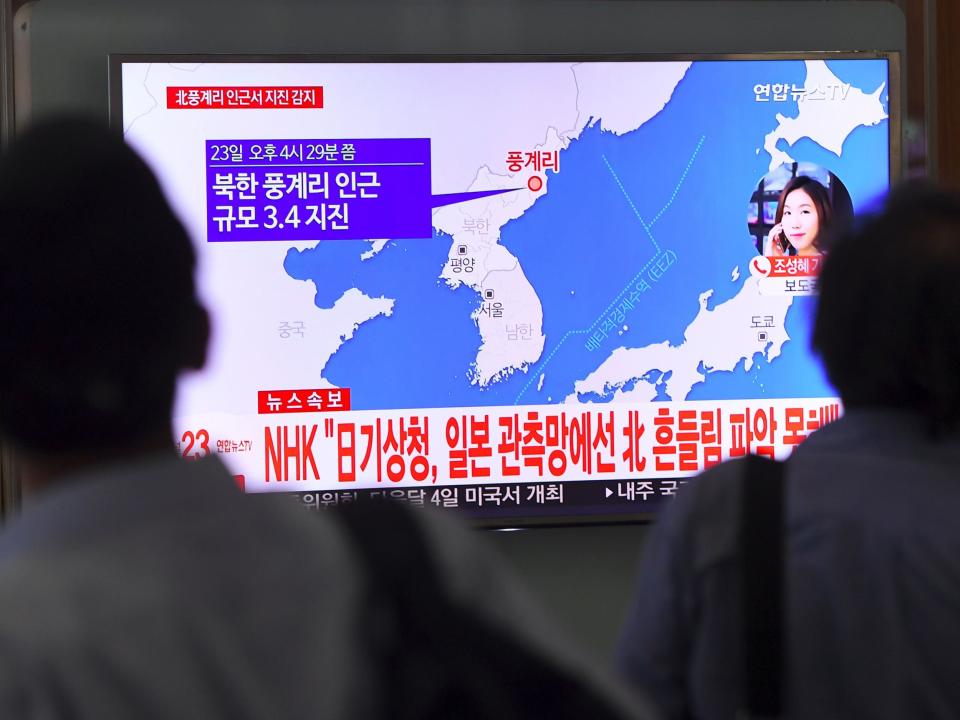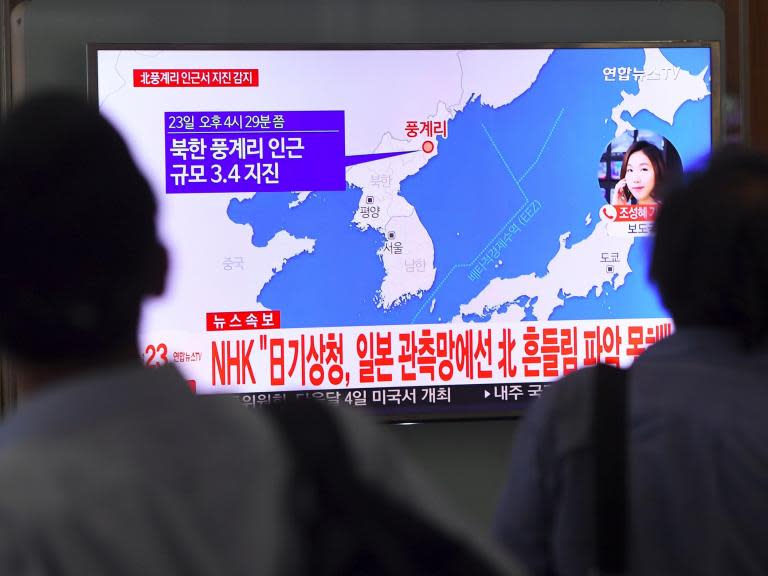North Korea: 3.4-magnitude earthquake caused by suspected explosion at surface, China says
China’s earthquake administration has said it detected a magnitude 3.4 earthquake in North Korea, which it suspects was caused by an explosion.
The report has raised fears that the isolated state has tested another nuclear bomb. The Chinese administration said in a statement on its website that the quake was recorded at a depth of zero kilometres.
China’s official Xinhua news agency said the epicentre was in roughly the same place as a similar shallow earthquake on 3 September, which turned out to be caused by North Korea’s sixth and largest nuclear test.
Yet the South’s meteorological agency – which measured the earthquake as magnitude 3.0 – said it believed the quake was a natural event.
“We use several methods to tell whether earthquakes are natural or manmade,” an official, who asked for anonymity, said.
“A key method is to look at the seismic waves or seismic acoustic waves and the latter can be detected in the case of a manmade earthquake. In this case we saw none. So as of now we are categorising this as a natural earthquake.”
All of North Korea’s previous six nuclear tests registered as earthquakes of magnitude 4.3 or above. The last test on 3 September registered as a 6.3 magnitude quake.
A secondary tremor detected after that test could have been caused by the collapse of a tunnel at the mountainous site, experts said at the time.
The US Geological Survey said that it detected a magnitude 3.5 quake in the area of previous North Korean nuclear tests, but that it was unable to confirm whether the event was natural.
North Korea’s weakest nuclear test, its first, which it carried out in 2006, generated a magnitude 4.3 quake.
Satellite photos of the area after the 3 September quake showed numerous landslides that were apparently caused by the huge blast, which North Korea said was a hydrogen bomb.
Nuclear proliferation watchdog CTBTO said on Saturday it had detected two seismic events in North Korea on Saturday but they were probably not deliberate explosions.
“Two #Seismic Events! ... unlikely Man-made! Similar to “collapse“ event 8.5 mins after DPRK6! Analysis ongoing,” CTBTO Executive Secretary Lassina Zerbo said in a Twitter post.
Two #Seismic Events! 0829UTC & much smaller @ 0443UTC unlikely Man-made! Similar to “collapse” event 8.5 mins after DPRK6! Analysis ongoing pic.twitter.com/DXaDn8TZOf
— Lassina Zerbo (@SinaZerbo) September 23, 2017
China’s earthquake administration said it had detected a magnitude 3.4 earthquake in North Korea that was a “suspected explosion”, while an official at South Korea’s meteorological agency said the initial view was that it was a natural quake.
North Korea’s Foreign Minister Ri Yong Ho, who is currently in New York for a United Nations meeting, warned on Thursday that Mr Kim could consider a hydrogen bomb test of an unprecedented scale over the Pacific.
Mr Ri told reporters that a test of “the most powerful detonation of an H-bomb” was one possible “highest-level” action against the US.
But he said that he did not know exactly what his state’s exact plans were. “We have no idea about what actions could be taken as it will be ordered by leader Kim Jong-un,” he added.
The quake comes amid heightened tensions around the Korean Peninsula, as the North has been maintaining a torrid pace in nuclear and weapons tests.
The state said its recent nuclear test was a detonation of a thermonuclear weapon built for its developmental intercontinental ballistic missiles.
In two July flight tests, those missiles showed potential capability to reach deep into the US mainland when perfected.
US President Donald Trump used a speech at the United Nations on Thursday to threaten to annihilate the isolated communist nation and deride the North’s leader as “a little rocket man”.
Mr Kim responded with an unprecedented personal statement in which he said Mr Trump would “pay dearly for his speech”.
Mr Kim said Mr Trump had insulted his country and he threatened to “surely and definitely tame the mentally deranged US dotard with fire”.
Experts have said Mr Kim’s statement carried added weight because it was unusually addressed to an international audience.
Agencies contributed to this report


